|
Court in Session
On a sultry June evening London’s West End traffic was again brought to a halt as thirsty crime-writers, agents, publishers and, most importantly, readers staged their annual blockade of Cecil Court for the Crime in the Court party thrown by Goldsboro Books.

It was an occasion for meeting up with old colleagues, such as the Irish imp John Connolly or more recent ones such as the talented Thomas Mogford, despite him being unaccountably called away sometimes for hours at a time.
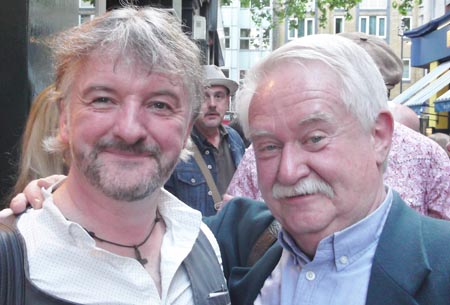
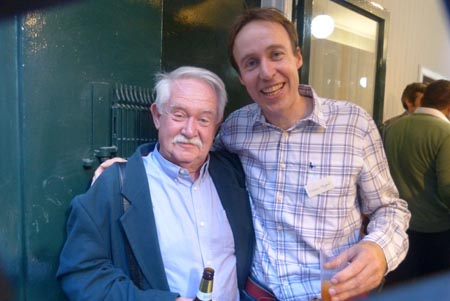
There were also new writers to meet such as Terry Stiastny, whose Acts of Omission is now out in paperback from John Murray, and Vaseem Khan, whose The Unexpected Inheritance of Inspector Chopra will be published by Mulholland next month.
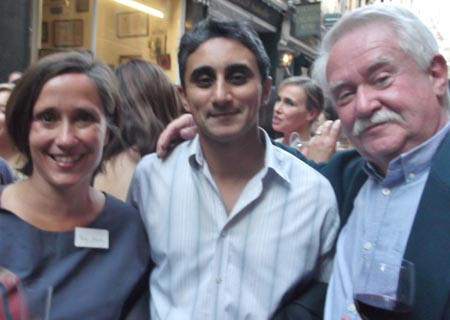
There was time to set the world to rights - there always is - with CWA Chairman, Detection Club member, novelist, anthology editor and multiple award winner (have I forgotten anything?) Len Tyler and Shots editor Mike ‘Tombstone’ Stotter. And there was also time to be brought down to Earth with a bump. It is always a pleasure to meet up with the incredibly well-read Bill and Toby Gottfried and I was momentarily flattered when Toby announced loudly, “You’re my favourite writer!” only to discover that she was actually hailing Stuart Neville, who was standing behind me.

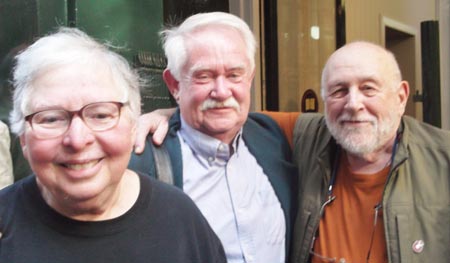
And the Award for Yet More Awards…
In August, winners will be announced in six categories for the Davitt Awards, organised by Sisters-in-Crime Down Under and named after Ellen Davitt, the author of Australia’s first mystery novel Force and Fraud: A Tale of the Bush back in 1865.
And also in August, the Deadly Ink Mystery Conference taking place in New Brunswick, New Jersey will be awarding the annual David Award for best mystery novel, named in memory of David G. Sasher.
Before then we are treated to possibly the silliest awards of all at the Theakston’s Old Peculier Crime Writing Festival at Harrogate - The Dead Good Reader Awards. These appear to be given in cutesy categories such as The Lee Child Award for Best Loner or Detective; The Val McDermid Award for Fiendish Forensics and The Reichenbach Falls Award for Most Epic Ending. (There are more in this vein but I am rapidly losing the will to live.) I am not sure what the criteria for online nomination were, but the vast majority of titles nominated seem remarkably recent to me.
For example, there are many curious omissions from the Lee Child Award for ‘best detective’ and as ‘best loner’ - for the latter I would have made a case for The Jackal (as in Day of) and surely Raymond Ingelram (the lone hero of the classic Rogue Male). One curious short-listing is in The Dr Lecter Award for Scariest Villain category - Stephen King’s famous 1978 crime novel (!) The Stand. Using the same logic, one wonders why Dracula - or even the much-missed Christopher Lee himself - didn’t get a look in.
The Dead Good (sic) Awards should not, of course, be confused with the actual Theakston’s Old Peculier Award for best crime novel, which is also dished out at Harrogate.
And short-lists have also been announced for the Crime Writers’ Dagger in the Library Awards in this country; in five categories for the Macavity Awards presented and in five categories for the annual Shamus Awards of the Private Eye Writers of America, all of which will be presented at Bouchercon in October; and for the annual Nero Award (for best American mystery written in the tradition of Rex Stout’s Nero Wolfe stories), which will be presented in New York in December.
Now is that everybody? I somehow doubt it.
Straddling the Pond
The history of crime writing is littered with pretty embarrassing attempts by British writers to set books in America (and vice versa) but in the 1990s, a new generation of Brits seemed to start getting it right. Famously we saw debuts from Lee Child (who moved to live in America) and John Connolly (okay, so he’s Irish and that bit nearer anyway) but others such as John Tilsley with titles such as Be A Good Boy Johnny and Nevada Blue, and Rob (now better known as Robert) Ryan with a trio of hard-boiled thrillers: Underdogs, Nine Mil and Trans Am.
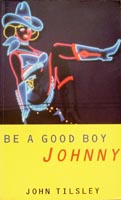 
There have been others of course, and more releases this year seem to be continuing the trend. Already available from Headline is The Outsider by London-born Jason Dean and in September comes a widely-anticipated debut from another Londoner, The Dark Inside by Rod Reynolds (published by Faber), which is set in 1946 in a small town on the Texas/Arkansas border.
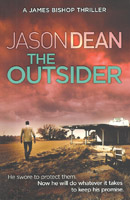 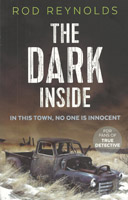
And speaking of Lee Child, it would be churlish not to mention that his 20th Jack Reacher novel, Make Me, will be published in September, at the very time Lee will be in the fine city of Norwich at a crime-writing festival called (rather cringingly) Noirwich. I suspect Lee was trying to second-guess the fixture list for next season’s Premiership football (or ‘soccer’ as he probably calls it) in the hope of seeing his beloved Aston Villa struggle against the might of newly-promoted Norwich City.
Sadly for Lee, on the week-end of the Noirwich festival, Aston Villa are playing West Bromwich Albion in a deadly-serious local derby, so perhaps Lee’s stay in Norwich will be brief as he may have a prior appointment in the Midlands.
Home on the Range
There is a considerable wealth of ‘home-grown’ American talent on display or shortly to arrive here.
Trumpeted in advance by no less a connoisseur than James Ellroy, Brian Panowich’s debut novel Bull Mountain (from Head of Zeus) is set among the feuding clans of North Georgia. With his customary restraint, Ellroy praises the book as “A stone gas and a stone winner…Brother-versus-brother in the dope-damned South…This first novel has it all: moonshine, Maryjane and mayhem” and I wouldn’t argue with that. I wouldn’t dare.
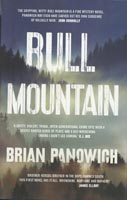
Paul Doiron in his latest, The Bone Orchard from Constable, moves the action to the state of Maine - which is a location well known for dark goings-on to fans of Stephen King and the aforementioned John Connolly.
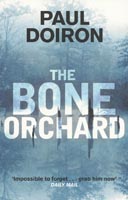
Doiron’s series hero, Mike Bowditch, is a former member of the Warden Service - the people who look after hunting, shooting, fishing and goodness knows what else in the stunningly beautiful Maine woods and mountains. {A Warden I got to know there swore blind that his biggest headache were the tourists pouring in from New York to see the trees turning red in their autumnal plumage. “Leaf People” he called them. And after a couple of beers, he called them something else.}
Needless to say in The Bone Orchard, the woods arefull of far more dangerous things and Bowditch, trying to opt out and work as a fishing guide, finds himself drawn into the hunt for a ruthless sniper.
Moving westward from New England to Chicago, we find the latest case for the engaging private eye Michael Kelly in The Governor’s Wife by Michael Harvey, published here by Bloomsbury.

I have waved a flag for Michael Harvey for some years now and can’t understand why he isn’t better known over here, where there has always been a die-hard following for the school of hard-boiled (but with a heart) private eyeand Harvey’s Ovid-reading (yes, Ovid!) Michael Kelly is a fine example of the tradition.
And if you prefer your American crime fiction ‘old school’ then you can do no better than make a beeline for the latest offerings from the excellently-named Hardcase Crime imprint of Titan Books.
This month those hard-nosed hardcases are reissuing a ‘lost’ Ed McBain novel which I think, staggeringly, is actually older than I am. Originally published as The Evil Sleep under the name Evan Hunter and thought to be his first crime novel (the sleep in question being induced by heroin), So Nude, So Dead as it was later retitled has been out-of-print for over fifty years - until this month.
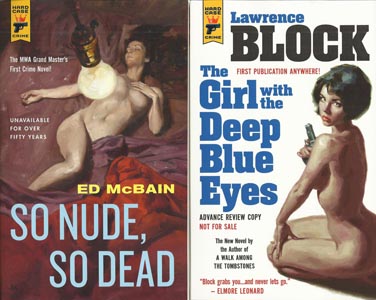
It is over 50 years since Lawrence Block’s first novel was published and more than a hundred have followed, including the brand new The Girl with the Deep Blue Eyes, which is published in September.
True Brit
Most crime writers would be happy if they created one successful crime series and inordinately proud if they became known for two. Peter Lovesey, possibly the leading exponent of the traditional British crime novel, after making his name with Victorian detective Sergeant Cribb and then Edwardian (literally) detective ‘Bertie’ (Prince of Wales), launched his most prolific series featuring Peter Diamond, now Chief Superintendent of Bath CID, in 1991.
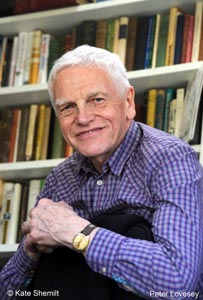
In his fifteenth outing, Down Among the Dead Men, published by Sphere this month, Lovesey even teams Diamond up with another of his characters from earlier novels, with whom Diamond has history, DCI Hen Mallin and why the policewoman has been temporarily suspended from duty is crucial to the plot of the novel.
Yet this is by no means a straightforward police-investigating-police case for Diamond and his irritating Assistant Chief Constable boss. There’s a man unjustly accused of murder in prison, a teacher missing from a private girls’ school in Chichester, a suspicious crowd of would-be artists, some highly imaginative horticulture and a well-organised criminal scheme to dispose of unwanted bodies. (Spoiler alert: there may be a clue in the title.)
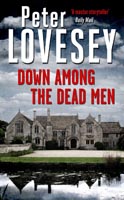
Predictions
Big sellers this month? Okay, these are not so much predictions as safe bets.
The writing partnership that is ‘Nicci French’ have almost made it to the end of the week in their series featuring psychotherapist Frieda Klein, with new novel Friday on My Mind from Michael Joseph.One wonders, following Blue Monday, Tuesday’s Child, Waiting for Wednesday and Thursday’s Child, what they have cooked up for the week-end.
 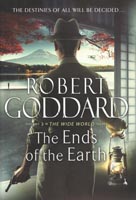
Another sure fire success will be the final part of Robert Goddard’s historical ‘Wide World’ trilogy, The Ends of the Earth, published by Bantam. Set in 1919, Goddard's rip-roaring adventure sees former flying ace ‘Max’ Maxsted tracking down the truth behind his father’s death from London to Paris to Imperial Japan.
And one prediction for next month, August: watch out for Texan journalist-turned-author Julia Heaberlin’s new thriller Black Eyed Susans, published here by Michael Joseph. There has been a very positive ‘vibe’ (as they say) in publishing circles about this book for several months and I have even heard it mentioned in the same breath as Thomas Harris’ Silence of the Lambs from 1988 and Patricia Cornwell’s Postmortem from 1990, a period which is increasingly being seen as something of a Golden Age for American thrillers.
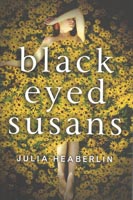
|
|
Gold Standard?
There was great excitement among devotees of ‘Golden Age’ detective stories when Dean Street Press announced it was republishing two “classics” by Ianthe Jerrold (1898-1977) in charming covers which remind me, oddly, of Woodbine cigarette packs: The Studio Crime, from 1929, and Dead Man’s Quarry from 1930, both featuring her amateur sleuth John Christmas.
I freely admit I had never heard of Ianthe Jerrold but given that her career in crime fiction coincided with that of Margery Allingham (her first Campion book appeared in 1929, they both came from journalistic families and there was only six years difference in their ages); I felt I had to give them a try. Interesting and more than competent they certainly are and it is odd that she only wrote two, but I am far from sure they are “classics” of the ‘Golden Age’ of English crime writing between the two world wars.
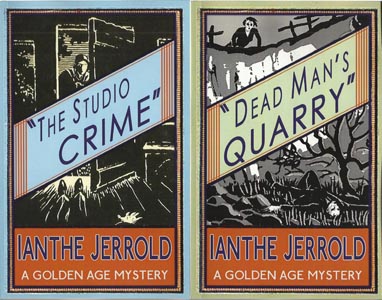
With The Studio Crime I had the distinct feeling that at times I was reading a Victorian novel. There is absolutely no mention of the Great War, there are “crossing sweepers” (in 1929?), no one thinks to use a telephone until more than 200 pages in and despite being set in central London, no mention of the Underground - the characters charge everywhere by taxi or by bus and one minor character, we are assured, “likes a blow on a bus”. There are also a lot of handkerchiefs in the story - a grimy one, a bloodstained one and one which miraculously is still damp with tears the day after it was discarded. Oh, and there’s a man in a Fez, which will certainly please CWA Chairman Len Tyler - the only man I know north of Casablanca who wears a Fez in public.
Having said that, the writing is at times clever and the dialogue nicely sharp and goodness knows I’ve read much worse published more recently. Some of the language may have the modern reader reaching for a dictionary (‘eupeptic’ anyone?) or fumbling a Google search for ‘Cloué’ but that in itself is no bad thing at all.
The main problem is with Jerrold’s rather vanilla amateur sleuth. John Christmas is a leisured gentleman of means, being the son of a department store magnate, supposedly witty, charming and urbane who has ‘detection’ as a hobby. He is of course, automatically consulted by a deferential Scotland Yard and given total access to the case of murder which happens more or less next door to where his friend (and ‘Watson’) is having a party. Christmas is, however, such an anodyne character that it is hard to feel anything much for him and it is hard to see him confronting a murderer face-to-face with the drama (or compassion) that a Poirot or a Wimsey or a Campion would bring to the scene.
On the other hand, the Watson figure (an artist and reluctant sidekick) and one of the female leads, novelist Serafine Wimpole, are splendidly drawn characters, full of fun and life. Ianthe Jerrold went on to write books in numerous genres but never returned to the detective story after these two. Is it possible that she decided that crime novels were just not for Christmas?
What’s Your Poison?
I am assured that none of the drinks will actually be poisoned, despite possible claims under the Trades Descriptions Act, at the What’s Your Poison? crime fiction party at Heffers bookshop in Cambridge on 16th July. (Tickets from https://goo.gl/CSDt53).

Among the authors appearing will be Susan Grossey, Nicola Upson, Mandy Morton, Janet Neel, Oliver Harris, Jeremy Cameron, Kate Rhodes, Timothy Williams, Peter Murphy, Peter Lovesey, Timothy Williams, Emily Winslow, Barbara Cleverly and B K Duncan. Oh, and I will be there too, shamelessly promoting my new collection of short stories, Angels and Others, from Telos Books.
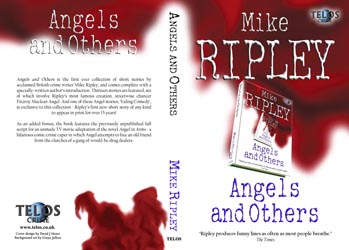
I am looking forward to spending a convivial evening (no speeches are allowed at this most civilised event) with Jeremy Cameron, whose “audacious and outrageous” first novel from 1995, Vinnie Got Blown Away is now back in print from Hope Road. The quote describing the first of Jeremy’s Walthamstow gangster novels is taken from my review in the Daily Telegraph. The intervening twenty years has not changed my opinion.
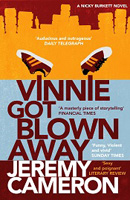 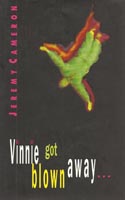
London Calling
The idea of setting a murder mystery in London during the Second World War has appealed to many a crime writer, among them John Lawton, Laura Wilson, Rennie Airth and, towards the end of his career, John Gardner with his much-under-rated ‘Suzi Mountford’ series. Now Cathi Unsworth gives us her take on the setting with a true Sohemian sense of noir. (‘Sohemian’ is a perfect blend of Soho and Bohemian, but think more Gerry’s Club than Colony.)
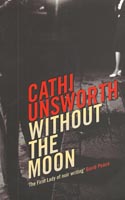
Based on two actual murder cases in 1942, one of them that of the notorious ‘Blackout Ripper’, Without the Moon (out this month from Serpent’s Tail) is a stunningly atmospheric thriller stuffed to bursting with characters only a city under siege (in more ways than one) could throw up and only a writer as good as Cathi Unsworth could control. The staggering thing is that many of Unsworth’s splendidly directed cast of characters are based on real people which clearly required an impressive amount of dedicated research.
Without the Moon is a tour-de-force and would certainly get my vote – not that I have one –in any of the myriad awards for ‘best of the year’. But then I may be biased as each chapter title is taken from a popular jazz/swing song of the era and I am proud to say I knew them all.
Entitled To A Title
Although I was once pressurised by a publisher to change the title of one of my novels because a best-selling American thriller writer was about to use it, there is actually no copyright on titles. To illustrate my point, I give you John Connor’s latest crime novel (now out from Orion), The Ice House.
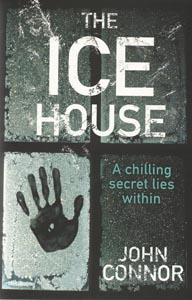 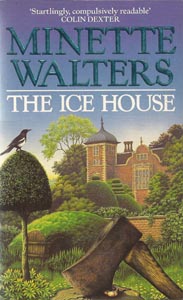 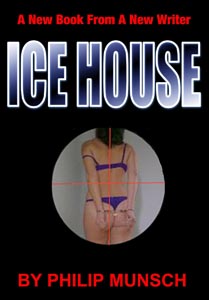 
Sherlock Joins the Club
It seems we just can’t get enough of Sherlock Holmes. Apart from reprints of the originals and non-fiction critical works, there have probably been at least twenty new fictional outings for the great detective so far this year and there will be another in September, Art in the Blood, by Hollywood executive and screenwriter Bonnie MacBird.

Set in December 1988, this latest Holmes/Watson adventure comes with an advance blurb (“Meticulous research, plausibility and grand fun!”) from eminent American Sherlockian Leslie S. Klinger, a charming man whom I met years ago in London when both of us, as it happened, were receiving Sherlock Awards.
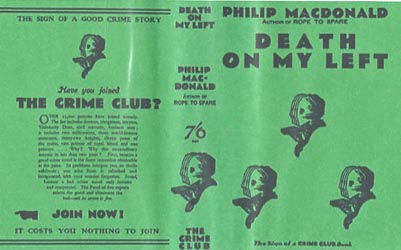
What I find particularly interesting is that Art in the Blood is published under the distinguished aegis of the Collins Crime Club; a publishing brand which I do not think has been used for twenty years. (My Angels in Arms in 1994 was one of the last published titles before the Crime Club went ‘dark’.)
Established in the 1930s, the Crime Club was never a ‘Book Club’ in the commercial sense, rather a mark of quality crime fiction and the imprint’s ‘Gunman’ logo has undergone a few changes over the years but is still recognisable.
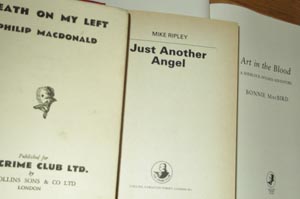
The examples above (taken completely at random from the library shelves here at Ripster Hall) show the Crime Club gunman in action in 1933, 1988 and now in 2015. There used to be a promotional magazine listing forthcoming titles for the Club, known unofficially as The Gunman’s Gazette and whilst I know of no plans to resurrect that, I am told that the famous imprint will be revived and used for reprints of ‘classic’ detective fiction and one of the authors in the frame, I hear, is Edmund Crispin - a most worthy target for the Gunman’s aim.
TV Times
I hear on my magical world of television grapevine (the magical bit being that somehow, despite the people involved, some programmes do get made) that a new crime/supernatural series is being made called Houdini and Doyle is being planned based on the real-life friendship of Harry Houdini and Arthur Conan Doyle.
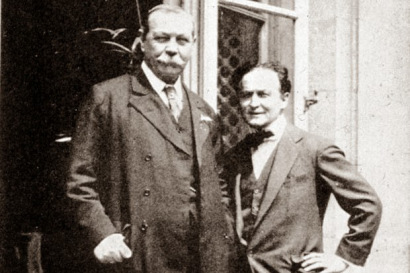
I can imagine how the idea was greeted at an early production meeting. ‘What a fantastic idea!’ somebody would have gushed. ‘The great escapologist teamed in a crime-fighting duo with the creator of the world’s greatest detective! Why hasn’t anyone thought of this before now?’
Actually,somebody did. That cultured and terribly cool American mystery writer Walter Satterthwait who produced the wonderfully mannered English whodunit Escapade some twenty years ago in 1995. Set in the country houses of 1920s England and featuring the aforementioned Harry and Arthur teaming up with Pinkerton detective Phil Beaumont (a name which might ring a bell with fans of classic private eye novels), Escapade was disgracefully overlooked in this country. In fact I do not think it ever found a UK publisher, though it did in France and Germany.

Fans of Doyle, Houdini, private eyes and affectionate pastiches of ‘Golden Age’ country house mysteries should try and track down this fantastic novel before television spoils even more of our illusions.
Though not everything on the old goggle-box is dire; some new crime drama is quite good and some of it is not even Scandinavian. I have a feeling though that the marvellous, anarchic No Offence created by Paul (‘Shameless’) Abbott, will not triumph in the SpecSavers Crime and Thriller Film and TV Dagger Awards (or whatever they are called) later this year. (Yes, more awards.)
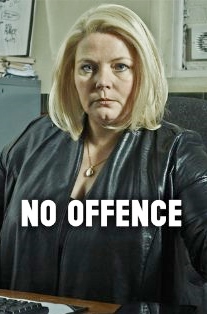
.jpg)
For a start it contains bad language, black humour and criminal nastiness, though the biggest factors against it are probably that it has three fantastically well-acted female leading characters and it is set in …wait for it…Manchester. Actually, I don’t really care if it wins an award or not, I’m just delighted that a second series has been commissioned.
Festival News
I have little Festival News to report as the recent Nordicana convention dedicated to Scandiwegian crime fiction past me by entirely. I had absolutely no idea the event was taking place until I heard reports of crowd-control measures being employed to contain the riots which ensued when Professor Barry Forshaw appeared at a public signing session of his books.
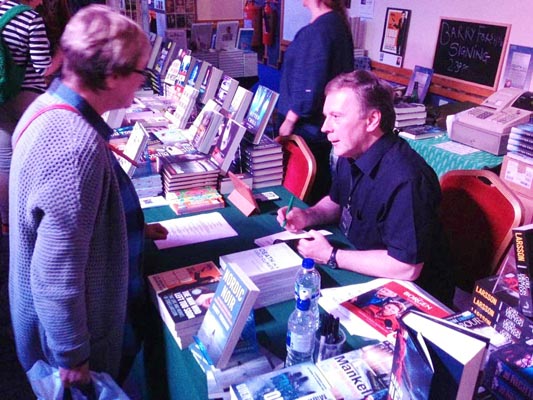
Being a fan of the ale in question for some 40 years, I have noted that there will be another Theakston’s Old Peculier Crime Writing Festival in Harrogate this month, though I have absolutely no idea what will be happening there apart from a fair amount of award-giving. I somehow think that this is not one of the prizes to be dished out (or ‘up’?).
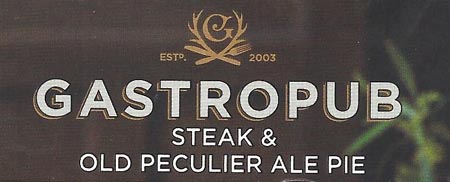
Toodles!
The Ripster.
|